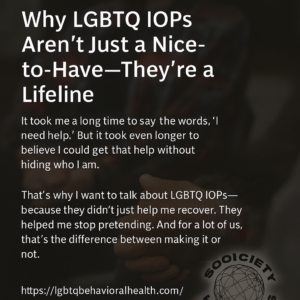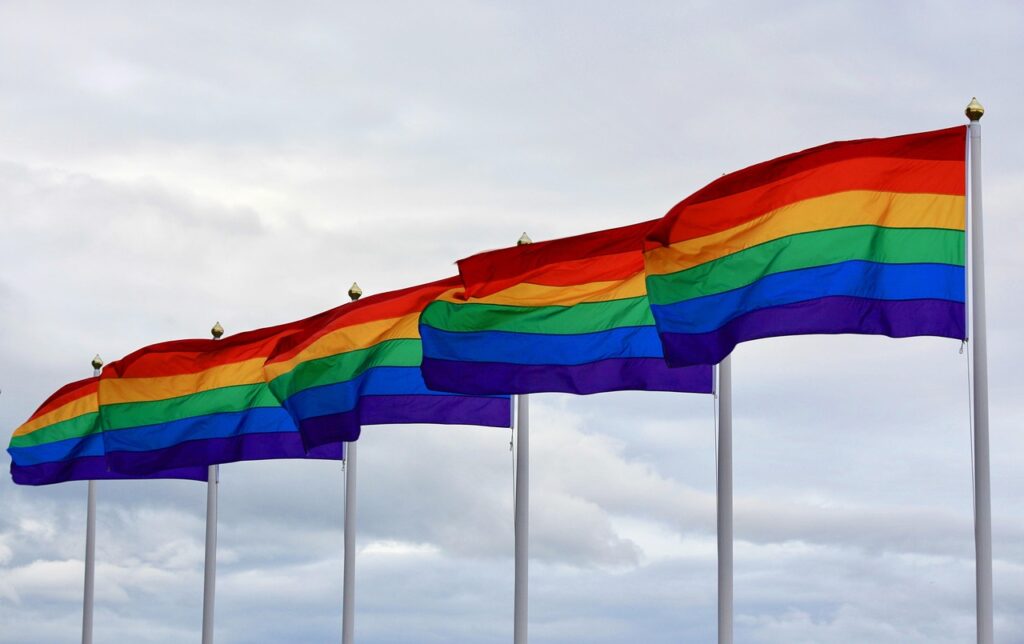It took me a long time to say the words, “I need help.” But it took even longer to believe I could get that help without hiding who I am.
That’s why I want to talk about LGBTQ IOPs—because they didn’t just help me recover. They helped me stop pretending. And for a lot of us, that’s the difference between making it or not.
Here’s why LGBTQ-specific IOPs are more than just a nice-to-have—they’re essential.
1. You Don’t Have to Translate Your Experience
Ever tried to explain queer trauma to someone who thinks it’s just about bullying? Or come out to your therapist in the middle of trying to survive detox? It’s exhausting. I can’t tell you how many times I’ve had to sidestep parts of my life just to be “understood” by a provider. That mental effort? It steals energy that should be going toward healing.
LGBTQ IOPs are built with that in mind. Staff are trained, peers get it, and nobody makes you start from scratch explaining what it’s like to be queer and hurting. You can skip the translation and get to the healing.
2. Safety Isn’t a Bonus—It’s the Baseline
In LGBTQ spaces, safety isn’t just about locking doors. It’s about feeling emotionally secure. These programs know that microaggressions, misgendering, or even just being the “only one like you” in a group can reopen old wounds or trigger shutdowns.
At Society Wellness, the focus isn’t just on “accepting” LGBTQ folks—it’s about building environments where you don’t have to defend your identity to feel safe. That’s not extra. That’s foundational.
3. The Group Room Feels Less Like a Minefield
I once left a group early because someone made a joke about pronouns. No one corrected them. No one even looked uncomfortable. In LGBTQ IOPs, group is different. It feels like exhaling. We can talk about hookup culture, identity confusion, chosen family—all without the side-eyes or silence.
When people relate to your story—even if their details are different—you’re more likely to show up, stay engaged, and keep coming back. And in recovery, consistency is everything.
4. You See Recovery Reflected Back at You
I remember the first time I saw a trans man leading group. He had a calm, grounded energy, and when he said he’d been clean for four years, something in me cracked open. I believed recovery was possible in a new way. Representation matters. It’s not about checking boxes—it’s about hope becoming real.
In LGBTQ IOPs, you’re more likely to see people who look like you, talk like you, and share parts of your journey. That makes healing feel reachable instead of theoretical.
5. It’s Not Just About Being LGBTQ—It’s About Being Understood
Here’s what surprised me most: the best part of LGBTQ IOP wasn’t just that I felt safe as a queer person. It was that I felt fully seen as a whole person. My addiction, my mental health, my grief, my resilience—it was all part of the picture.
This level of understanding goes beyond acceptance. It’s a kind of presence you can’t fake. And when you’ve spent your life feeling half-visible, being fully seen can be life-saving.
6. Real Talk About Real Risks
The stats are rough. LGBTQ people are more likely to face depression, anxiety, trauma, substance use, and suicide. And it’s not because we’re inherently more at risk—it’s because we’ve often lived through more rejection, more violence, more silence.
LGBTQ IOPs don’t tiptoe around this. They talk about it head-on. Not in a doom-and-gloom way, but in a “you’re not alone and this is real” kind of way. That honesty helped me stop blaming myself. It made space for healing.

7. You Don’t Have to Pick Between Pride and Recovery
In some programs, I felt like I had to mute myself to fit in. Tone down the makeup. Don’t talk about queer bars or polyamory. Hide the parts of me that might make others uncomfortable.
In LGBTQ IOPs, that all fell away. I didn’t have to choose between being sober and being proud. I could be both. Fully. Messy and honest and enough.
8. The Curriculum Includes Us
Addiction doesn’t exist in a vacuum—and neither do we. LGBTQ IOPs often include modules on gender identity, coming out trauma, internalized shame, and building chosen family. These aren’t “special topics”—they’re core parts of the work.
When your curriculum includes your culture, your questions, and your truth, healing hits different.
9. You Build a Community That Feels Like Home
I met people in LGBTQ IOP who are still in my life. Not because we were all best friends, but because there was a deep understanding between us. We’d all fought similar battles. We knew what it felt like to try to get clean in a world that doesn’t always make space for us.
That kind of community doesn’t just help you stay sober. It helps you stay alive.
FAQs About LGBTQ IOPs
What is an LGBTQ IOP?
An LGBTQ IOP (Intensive Outpatient Program) is a structured treatment program designed specifically for LGBTQ individuals struggling with addiction and/or mental health. It offers therapy, group support, and recovery tools while centering LGBTQ identities and needs.
How is it different from a regular IOP?
While both provide clinical care, LGBTQ IOPs address the unique social, emotional, and cultural challenges LGBTQ individuals face. That includes queer-specific trauma, identity exploration, and creating safe group spaces.
Can straight allies attend LGBTQ IOPs?
Some programs are strictly for LGBTQ individuals, while others may welcome allies who are respectful and aligned with the space’s values. Always ask upfront to ensure the right fit.
Do I have to be out to join?
No. You don’t have to be out publicly to benefit from LGBTQ IOP. These spaces are confidential and affirming, offering support no matter where you are in your journey.
Is LGBTQ IOP only for substance use?
Not always. Many programs also support co-occurring mental health issues like anxiety, depression, PTSD, and more.
Ready to Feel Seen While You Heal?
If you’re looking for a program where you don’t have to check your identity at the door, Society Wellness offers an LGBTQ IOP designed to help you recover without erasing who you are. Explore our intensive outpatient program or call us directly at (888) 964-8116. Your story matters. So does your safety.

